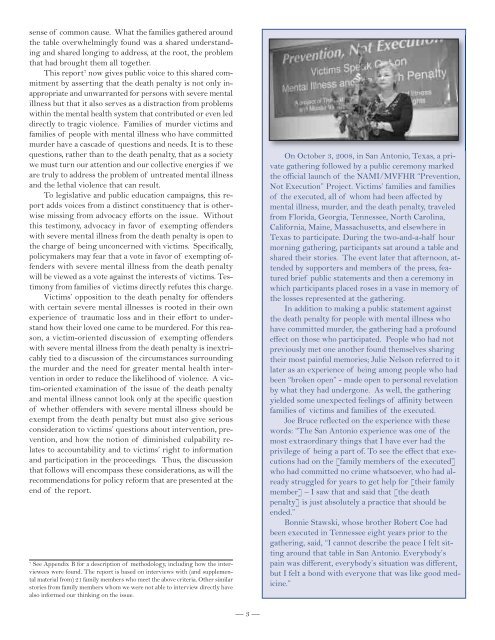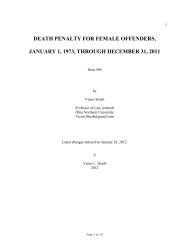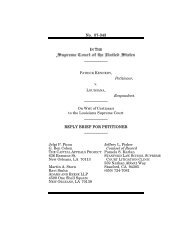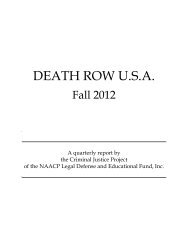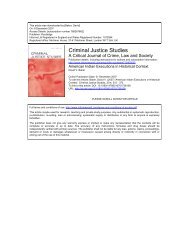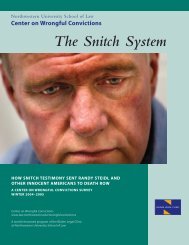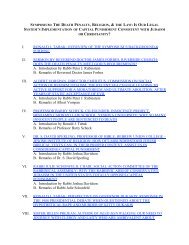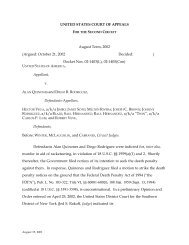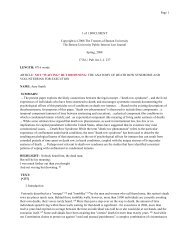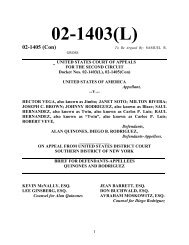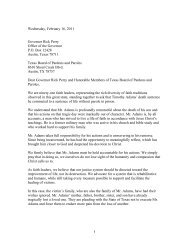Double Tragedies - Families for Human Rights
Double Tragedies - Families for Human Rights
Double Tragedies - Families for Human Rights
- No tags were found...
You also want an ePaper? Increase the reach of your titles
YUMPU automatically turns print PDFs into web optimized ePapers that Google loves.
sense of common cause. What the families gathered aroundthe table overwhelmingly found was a shared understandingand shared longing to address, at the root, the problemthat had brought them all together.This report 7 now gives public voice to this shared commitmentby asserting that the death penalty is not only inappropriateand unwarranted <strong>for</strong> persons with severe mentalillness but that it also serves as a distraction from problemswithin the mental health system that contributed or even leddirectly to tragic violence. <strong>Families</strong> of murder victims andfamilies of people with mental illness who have committedmurder have a cascade of questions and needs. It is to thesequestions, rather than to the death penalty, that as a societywe must turn our attention and our collective energies if weare truly to address the problem of untreated mental illnessand the lethal violence that can result.To legislative and public education campaigns, this reportadds voices from a distinct constituency that is otherwisemissing from advocacy ef<strong>for</strong>ts on the issue. Withoutthis testimony, advocacy in favor of exempting offenderswith severe mental illness from the death penalty is open tothe charge of being unconcerned with victims. Specifically,policymakers may fear that a vote in favor of exempting offenderswith severe mental illness from the death penaltywill be viewed as a vote against the interests of victims. Testimonyfrom families of victims directly refutes this charge.Victims’ opposition to the death penalty <strong>for</strong> offenderswith certain severe mental illnesses is rooted in their ownexperience of traumatic loss and in their ef<strong>for</strong>t to understandhow their loved one came to be murdered. For this reason,a victim-oriented discussion of exempting offenderswith severe mental illness from the death penalty is inextricablytied to a discussion of the circumstances surroundingthe murder and the need <strong>for</strong> greater mental health interventionin order to reduce the likelihood of violence. A victim-orientedexamination of the issue of the death penaltyand mental illness cannot look only at the specific questionof whether offenders with severe mental illness should beexempt from the death penalty but must also give seriousconsideration to victims’ questions about intervention, prevention,and how the notion of diminished culpability relatesto accountability and to victims’ right to in<strong>for</strong>mationand participation in the proceedings. Thus, the discussionthat follows will encompass these considerations, as will therecommendations <strong>for</strong> policy re<strong>for</strong>m that are presented at theend of the report.7See Appendix B <strong>for</strong> a description of methodology, including how the intervieweeswere found. The report is based on interviews with (and supplementalmaterial from) 21 family members who meet the above criteria. Other similarstories from family members whom we were not able to interview directly havealso in<strong>for</strong>med our thinking on the issue.On October 3, 2008, in San Antonio, Texas, a privategathering followed by a public ceremony markedthe official launch of the NAMI/MVFHR “Prevention,Not Execution” Project. Victims’ families and familiesof the executed, all of whom had been affected bymental illness, murder, and the death penalty, traveledfrom Florida, Georgia, Tennessee, North Carolina,Cali<strong>for</strong>nia, Maine, Massachusetts, and elsewhere inTexas to participate. During the two-and-a-half hourmorning gathering, participants sat around a table andshared their stories. The event later that afternoon, attendedby supporters and members of the press, featuredbrief public statements and then a ceremony inwhich participants placed roses in a vase in memory ofthe losses represented at the gathering.In addition to making a public statement againstthe death penalty <strong>for</strong> people with mental illness whohave committed murder, the gathering had a profoundeffect on those who participated. People who had notpreviously met one another found themselves sharingtheir most painful memories; Julie Nelson referred to itlater as an experience of being among people who hadbeen “broken open” - made open to personal revelationby what they had undergone. As well, the gatheringyielded some unexpected feelings of affinity betweenfamilies of victims and families of the executed.Joe Bruce reflected on the experience with thesewords: “The San Antonio experience was one of themost extraordinary things that I have ever had theprivilege of being a part of. To see the effect that executionshad on the [family members of the executed]who had committed no crime whatsoever, who had alreadystruggled <strong>for</strong> years to get help <strong>for</strong> [their familymember] – I saw that and said that [the deathpenalty] is just absolutely a practice that should beended.”Bonnie Stawski, whose brother Robert Coe hadbeen executed in Tennessee eight years prior to thegathering, said, “I cannot describe the peace I felt sittingaround that table in San Antonio. Everybody’spain was different, everybody’s situation was different,but I felt a bond with everyone that was like good medicine.”__ 3 __


